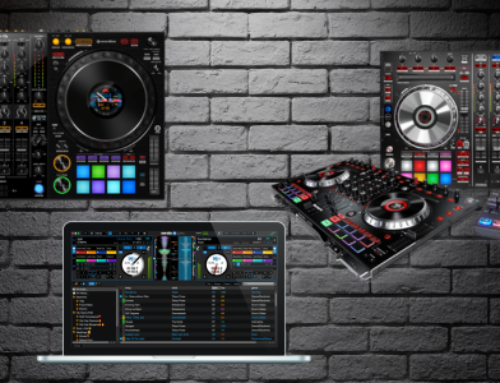A Perspective from DJ Mike
Introduction
In the world of professional DJing, the role encompasses far more than simply playing music. It is a blend of art, technology, and business acumen. As a co-host of the podcast “2 DJs 1 Mic” and an experienced DJ, I’ve often encountered debates about the technical proficiency required for a successful career in DJing. This article explores two critical questions: should a NASCAR driver be required to be a mechanic or have working knowledge of how a car functions, and should a professional DJ be technically sound regarding the tasks necessary for their job? This exploration aims to provide a nuanced understanding of the importance of technical knowledge in DJing.
The NASCAR Analogy
Should a NASCAR Driver Be Required to Be a Mechanic?
To draw parallels between DJing and NASCAR driving, it’s essential to understand the role of a NASCAR driver. A NASCAR driver is primarily responsible for navigating the vehicle through a race, leveraging skill, reflexes, and strategic thinking. While it’s not mandatory for a driver to be a certified mechanic, having a working knowledge of the car’s mechanics can be highly beneficial. This knowledge allows drivers to communicate effectively with their pit crew, understand the car’s limitations, and make informed decisions during a race.
Similarly, in DJing, while it may not be necessary for a DJ to be an expert in all technical aspects, having a fundamental understanding of the equipment and software can significantly enhance their performance. Just as a NASCAR driver benefits from understanding their vehicle, a DJ can benefit from understanding their tools.
Technical Knowledge in NASCAR
NASCAR drivers who possess a good grasp of their car’s mechanics often perform better because they can diagnose issues quickly, provide precise feedback to their mechanics, and make real-time adjustments during a race. This technical knowledge does not replace the need for a skilled pit crew but complements it, leading to more cohesive teamwork and better outcomes.
The Balance of Skills
In both NASCAR and DJing, there is a balance between technical knowledge and specialized roles. Drivers focus on driving, while mechanics handle repairs. Similarly, DJs focus on curating and mixing music, while tech specialists can handle more complex technical tasks. However, the synergy between these roles is crucial, and a foundational understanding of each other’s domains fosters better collaboration.
The Role of Technical Proficiency in DJing
Should a Professional DJ Be Technically Sound?
In the DJing industry, technical proficiency is increasingly becoming a critical component of a DJ’s skill set. As technology evolves, DJs must adapt to new equipment, software, and techniques. The question arises: should DJs be technically proficient, or is it acceptable for them to delegate technical tasks to others?
The Argument for Technical Proficiency
- Autonomy and Independence: DJs who are technically sound can operate independently without relying on external help for tasks such as downloading and organizing music, converting tracks to compatible formats, and troubleshooting equipment issues. This autonomy ensures that they are always prepared, regardless of unforeseen circumstances.
- Improved Performance: Understanding the intricacies of their equipment allows DJs to utilize its full potential, leading to more creative and seamless performances. Technical knowledge can inspire confidence, enabling DJs to experiment with new techniques and push the boundaries of their artistry.
- Professionalism and Reliability: Clients and event organizers often prefer DJs who can handle technical aspects independently. This reliability can enhance a DJ’s reputation, leading to more bookings and opportunities. Being technically proficient demonstrates a commitment to the craft and a willingness to go the extra mile.
- Adaptability: The music industry is dynamic, with new technologies and trends emerging regularly. DJs who stay updated with technical advancements can adapt quickly, ensuring they remain relevant and competitive in the market.
The Argument for Delegation
- Specialization and Focus: Some argue that DJs should focus solely on their core competency—curating and mixing music. By delegating technical tasks to specialists, DJs can concentrate on refining their musical skills and delivering exceptional performances.
- Efficiency: Hiring technical support can lead to more efficient operations. Tech specialists are often more adept at handling complex technical issues, allowing DJs to avoid potential pitfalls and delays.
- Collaboration and Teamwork: Collaboration between DJs and technical experts can lead to better outcomes. Each party brings their expertise to the table, resulting in a more polished and professional performance. This approach mirrors the NASCAR driver-mechanic relationship, where teamwork is key.
- Scalability: As DJs scale their careers, managing all aspects of their work can become overwhelming. Delegating technical tasks allows them to focus on strategic growth and expanding their brand.
A Balanced Approach
While there are valid arguments on both sides, a balanced approach may be the most effective. DJs should strive to attain a fundamental level of technical proficiency while also recognizing when it’s beneficial to seek specialist support. This balance ensures that they can operate independently when necessary but are also prepared to collaborate for more complex tasks.
Practical Tips for DJs
Enhancing Technical Skills
- Education and Training: Invest in courses and workshops that cover essential technical skills. Many online platforms offer tutorials on DJ software, equipment setup, and troubleshooting.
- Hands-On Practice: Spend time experimenting with your equipment. Familiarize yourself with all its features and functions. Practice common technical tasks, such as track conversion and file organization.
- Networking: Connect with other DJs and technical experts. Sharing knowledge and experiences can provide valuable insights and tips.
- Staying Updated: Keep abreast of the latest advancements in DJ technology. Subscribe to industry magazines, follow tech blogs, and participate in forums and communities.
Collaborating with Technical Experts
- Identify Reliable Partners: Build a network of trustworthy technical experts who can provide support when needed. Establish clear communication and expectations.
- Define Roles and Responsibilities: Clearly outline the technical tasks that you will handle and those that will be delegated. Ensure there is a mutual understanding of each other’s roles.
- Regular Check-Ins: Maintain regular communication with your technical team. Schedule check-ins to discuss upcoming events, potential challenges, and new opportunities for collaboration.
- Feedback and Improvement: After each event, seek feedback from your technical team. Discuss what worked well and areas for improvement. Use this feedback to refine your processes.
Real-World Examples
Successful DJs with Technical Proficiency
- Carl Cox: Renowned for his technical prowess, Carl Cox is a prime example of a DJ who excels both musically and technically. His deep understanding of DJ equipment and software has allowed him to innovate and deliver captivating performances consistently.
- Richie Hawtin: Known for his technological innovations, Richie Hawtin seamlessly integrates cutting-edge technology into his sets. His technical expertise has set him apart as a pioneer in the industry.
DJs Who Excel Through Collaboration
- David Guetta: While David Guetta is a masterful DJ, he often collaborates with technical experts to enhance his performances. This collaboration has enabled him to focus on his music while delivering visually and sonically stunning shows.
- Tiësto: Tiësto works closely with a team of technical specialists to create immersive experiences. His willingness to delegate technical tasks has allowed him to concentrate on his creative vision.
The Importance of Understanding Your Equipment
Knowledge Equals Power
For DJs, understanding the equipment they use is akin to a painter knowing their brushes and paints. The depth of this knowledge can significantly impact the quality of the performance. Familiarity with equipment features, from mixers to turntables and digital audio interfaces, allows DJs to maximize the potential of their gear.
Troubleshooting On-the-Fly
Technical issues can arise at any moment, often without warning. A DJ who understands their equipment can quickly diagnose and resolve problems, minimizing downtime and maintaining the flow of the event. This ability to troubleshoot on-the-fly is crucial, especially during live performances where every second counts.
Customization and Optimization
Knowing the ins and outs of their equipment enables DJs to customize settings to suit their style and preferences. Whether it’s adjusting EQ settings, configuring MIDI mappings, or optimizing software workflows, this customization can lead to a more personalized and efficient setup.
The Evolving Landscape of DJ Technology
Digital Revolution
The digital revolution has transformed the DJ industry, introducing new tools and techniques that have expanded the possibilities for creative expression. From digital vinyl systems (DVS) to performance software like Serato DJ and Traktor, technology has opened up new avenues for innovation.
Integration of Software and Hardware
Modern DJ setups often involve a seamless integration of software and hardware. Understanding how these components interact is essential for creating cohesive and dynamic performances. DJs must be adept at managing digital music libraries, navigating software interfaces, and utilizing hardware controllers to their full potential.
The Rise of Live Remixing and Production
Live remixing and production have become integral to many DJ performances. DJs are now expected to manipulate tracks in real-time, adding loops, samples, and effects to create unique versions of songs. This shift requires a deep understanding of both the creative and technical aspects of music production.
The Role of Continuous Learning
Staying Ahead of the Curve
The DJ industry is constantly evolving, with new technologies and trends emerging regularly. DJs who commit to continuous learning can stay ahead of the curve, ensuring they remain competitive and relevant. This commitment involves not only staying updated with the latest gear and software but also honing skills and exploring new techniques.
Workshops and Masterclasses
Attending workshops and masterclasses led by industry experts can provide valuable insights and hands-on experience. These sessions offer opportunities to learn from seasoned professionals, ask questions, and receive personalized feedback.
Online Resources and Communities
The internet is a treasure trove of resources for DJs. Online tutorials, forums, and communities provide a wealth of information on everything from basic setup guides to advanced mixing techniques. Engaging with these resources can enhance technical skills and foster a sense of community among DJs.
Building a Strong Technical Foundation
Starting with the Basics
For aspiring DJs, building a strong technical foundation starts with mastering the basics. This includes understanding the core components of a DJ setup, such as mixers, turntables, CDJs, and controllers. Learning how to set up and operate this equipment is the first step toward technical proficiency.
Exploring Digital Music Management
Digital music management is a critical skill for modern DJs. Organizing and tagging tracks, creating playlists, and managing a digital library are essential tasks that require attention to detail and organization. Familiarity with software like iTunes, Rekordbox, and Serato DJ can streamline these processes.
Experimenting with Effects and Transitions
Effects and transitions are powerful tools in a DJ’s arsenal. Experimenting with different effects, such as reverb, delay, and filters, can add depth and dimension to a set. Similarly, mastering various transition techniques, such as beatmatching, cutting, and blending, can create seamless mixes that keep the dance floor moving.
The Business Side of DJing
Managing Bookings and Contracts
In addition to technical skills, DJs must also navigate the business side of the industry. Managing bookings, negotiating contracts, and maintaining a professional image are all crucial aspects of building a successful career. Technical proficiency can enhance a DJ’s credibility and reliability, leading to more opportunities and better client relationships.
Marketing and Branding
Effective marketing and branding are essential for standing out in a competitive market. DJs should leverage social media, create engaging content, and build a strong online presence to attract potential clients and fans. Technical skills can play a role here as well, as DJs who can produce high-quality mixes and promotional materials are more likely to capture attention.
Financial Management
Financial management is another important aspect of the business side of DJing. Keeping track of income and expenses, budgeting for new equipment, and understanding tax obligations are all part of running a successful DJ business. Technical proficiency can lead to better financial outcomes by reducing reliance on external help and minimizing costly mistakes.
Real-World Challenges and Solutions
Navigating Technical Issues
Technical issues are an inevitable part of DJing. Whether it’s a software crash, hardware malfunction, or connectivity problem, being able to navigate these challenges is crucial. DJs who are technically proficient can quickly identify and resolve issues, ensuring that their performance remains uninterrupted.
Adapting to Different Venues
Every venue presents unique technical challenges. From varying sound systems to different setups and acoustics, DJs must be adaptable and prepared to handle diverse environments. Technical knowledge allows DJs to adjust their setup to suit the venue, optimizing sound quality and performance.
Handling Client Requests
Clients often have specific requests, such as playing particular tracks or accommodating unique setups. DJs who can efficiently download, convert, and organize music can better meet these demands, enhancing client satisfaction and professionalism.
The Future of DJing
Embracing Technological Advancements
The future of DJing will undoubtedly be shaped by technological advancements. Virtual reality, artificial intelligence, and blockchain technology are just a few innovations that could transform the industry. DJs who embrace these advancements and stay at the forefront of technological trends will be well-positioned for success.
The Role of Artificial Intelligence
Artificial intelligence (AI) is already making waves in the music industry, with AI-generated tracks and smart mixing algorithms becoming more prevalent. While AI can enhance a DJ’s capabilities, it also underscores the importance of technical knowledge. DJs must understand how to integrate AI tools into their workflow while maintaining their unique creative vision.
Sustainability and Eco-Friendly Practices
As awareness of environmental issues grows, sustainability is becoming a priority for many industries, including DJing. DJs can adopt eco-friendly practices, such as using energy-efficient equipment and reducing waste. Technical knowledge can aid in identifying and implementing sustainable solutions.
Conclusion
The question of whether DJs should be technically sound or delegate technical tasks is multifaceted. While technical proficiency can enhance a DJ’s independence, creativity, and reliability, collaboration with technical experts can lead to more efficient and scalable operations. Ultimately, a balanced approach that combines technical knowledge with strategic delegation can empower DJs to excel in their craft.
In the evolving landscape of DJing, embracing both technical skills and collaborative practices will enable DJs to navigate challenges, seize opportunities, and continue delivering unforgettable experiences. Just as a NASCAR driver benefits from understanding their vehicle, a DJ’s understanding of their equipment can propel them to new heights in their career.







Leave A Comment